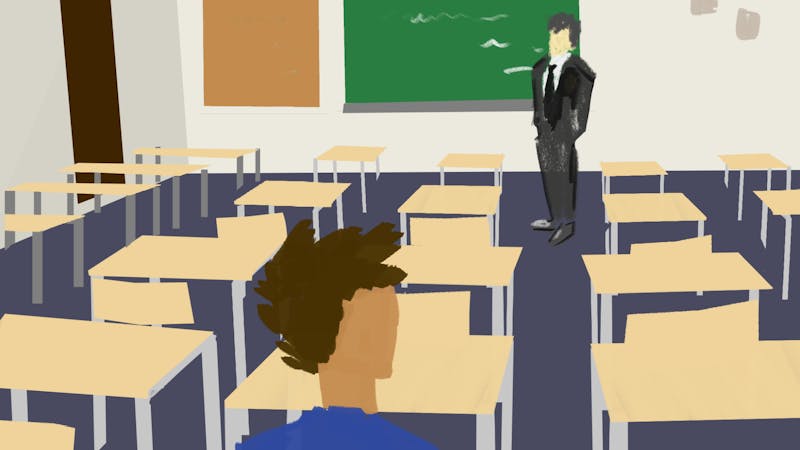TV host encourages legalization
To put it bluntly, the Baker Institute's drug-legalization conference reached a high last Thursday when travel show host and writer Rick Steves spoke about Europe's marijuana policies to an audience of around 300 students, faculty and visitors.
Steves was the keynote speaker of the Baker Institute conference "The War on Drugs has Failed. Is Legalization the Answer?"
Steves opened his lecture with multiple anecdotes of his global travels accompanied by a photo slideshow. For 30 years, Steves and his team spent four months a year traveling around the world. He said the value of travel comes from its ability to broaden perspectives.
"Travel opens you up to other cultures you wouldn't experience in America," Steves said. "Other people are evangelical about things that we don't even know are exciting."
Steves added that the people he met taught him that everyone has a different goal in life and should not be condemned for thinking differently.
"I thought the world was a pyramid with us on top and everyone else trying to get there, but not everyone has the American dream," Steves said.
Steves segued into a comparison of Europe and America's drug policies by discussing the legislation of morality in the U.S. and its effects on illegal drug use.
He said that Americans are inherently moral and feel motivated to make laws against practices they consider immoral, such as drug and alcohol consumption.
However, according to Steves, Europeans take a more pragmatic approach in such situations, focusing on harm-reduction techniques, such as decriminizalization and education, rather than incarceration and criminal punishment. He said every European country has its own way of handling substance abuse.
For example, Switzerland installs blue lights in its public bathrooms to prevent heroin addicts from seeing their veins to shoot up and provides subsidized needle dispensers to discourage needle-sharing, Steves said.
Furthermore, the Swiss government funds clinics to provide counseling and rehabilitation so that drug addicts are seen as sick people rather than criminals, he noted.
Steves focused the rest of his lecture on marijuana, stating that the drug is legal in many European countries and that studies have shown that there is no correlation between marijuana legalization and usage levels.
Countries like the Netherlands even have coffee shops that sell marijuana over the counter, albeit discreetly, Steves said.
Steves stated that the U.S. has actually forced other countries to tighten their drug policies through the threat of international trade restrictions.
"Countries must use the term 'decriminalization' when referring to drug legalization because if the U.S. hears that drugs are legal in a certain country, they will automatically impose trade sanctions," Steves noted.
Steves said he supported the legalization of marijuana in the U.S. because it would decrease criminal violence by preventing people from seeking out illegal sources of the drug.
He added that adults who smoke marijuana casually are not criminals, and marijuana is not a devastating "hard drug" - like heroin - if taken in moderation.
"'High' is a place, and a lot of people want to go there," Steves said. "Speakers sound really good, and people are great cooks."
After his lecture, Steves fielded questions on topics ranging from medical marijuana to civil liberties. He said he believes that all responsible adults have a civil liberty to smoke marijuana.
Professor Emeritus of Sociology William Martin said he agreed with Steves' views on drug legalization.
"I do not have a romantic view of the use of drugs, including alcohol, the drug that causes the most serious problems for individual users and society," Martin said. "It makes more sense for the government to have control of producing, distributing and selling drugs, rather [than] leaving that in the hands of criminals who have no interest in acting responsibly."
Steves is the host of TV show Rick Steves' Europe and public radio series Travel with Rick Steves. He serves as a board member of the National Organization for the Reform of Marijuana Laws and co-wrote a documentary about marijuana.
He also co-sponsored Initiative 502, a ballot measure aimed at legalizing, regulating and taxing the sale of marijuana in the state of Washington. The proposal is currently under consideration.
More from The Rice Thresher

Jones wins men’s and women’s Beer Bike races, GSA snags alumni
Jones College won both the women’s and men’s Beer Bike 2024 races, while the Graduate Student Association claimed the alumni team win. Hanszen College bike teams were the runner-up in the alumni and men’s races, while Brown College was the runner-up in the women’s race. Martel and McMurtry Colleges did not bike in the alumni race, according to the Rice Program Council’s final report, and the GSA was disqualified from the men’s race for accidentally sending out two bikers simultaneously.

Rice wraps up Conversations on the Middle East series, looks to fall semester
With the final session rescheduled to Wednesday April 17, the Conversations on the Middle East series is coming to a close.

Rice SJP hosts protest in response to S.RES 02 tabling
Rice Students for Justice in Palestine staged a walkout and protest in response to the tabling of S.RES 02, a resolution that proposed a divestment of student funds to Israel-aligned companies, outside the Allen Center, April 12. The protest occurred during Owl Days, when prospective students were touring the campus.

Please note All comments are eligible for publication by The Rice Thresher.